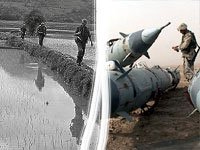 Bush’s public relations offensive against his anti-war critics is uphill work. Within two years, polls show, Americans soured on the Iraq War — far more quickly than they did during Vietnam. Why?
Bush’s public relations offensive against his anti-war critics is uphill work. Within two years, polls show, Americans soured on the Iraq War — far more quickly than they did during Vietnam. Why?
by Sanford Gottlieb
Editor’s Note: On the home front, at least, Iraq is no Vietnam, writes PNS contributor Sanford Gottlieb. In just two short years, American support for war in Iraq has waned. No missing WMD, several early, prominent war critics, more middle-of-the-road protesters than in Vietnam and even Hurricane Katrina helped turn the tide.
–The rationale for invading Iraq began to unravel early; the Cold War mindset that fueled U.S. intervention in Vietnam remained intact.
During Vietnam most Americans believed the conflict was part of a global struggle against communism. By the time President Johnson committed combat troops to Vietnam in 1965, public attitudes had been shaped by 18 years of Cold War. The Soviet Union and “Red” China represented a fearsome threat, and the Vietnamese Communists, despite their nationalist history, were seen as tools of Moscow and Beijing. South Vietnam was viewed as a domino, first in a line, ready to fall. “If we don’t fight them there,” AFL-CIO President George Meany said, “we’ll have to fight them in San Francisco.” That mindset helped keep American troops in Vietnam for eight bloody years…
During Iraq, by contrast, the Bush administration claimed there was a mortal threat from an Iraqi dictator with weapons of mass destruction and links to Al Qaeda. In 2002, President Bush conjured up the image of a mushroom cloud. On the eve of war, Vice President Dick Cheney asserted, “We believe (Saddam) has, in fact, reconstituted nuclear weapons.” Colin Powell’s address to the United Nations, which he now considers a blot on his record, was persuasive in 2003.
The administration disparaged pre-war U.N. inspectors who failed to find WMD, but after the invasion Bush could hardly dismiss identical reports by his own inspectors. The public, at first supportive of the war, began to question it.
–Prominent critics spoke up during the early stages of the Iraq War; they were mute for a long time during Vietnam.
Brent Scowcroft, former national security advisor for George Bush Sr., publicly questioned the Iraq War’s premises from the start. Former antiterrorist chief Richard Clarke, retired Marine general Anthony Zinni, ex-ambassador Joseph Wilson and former State Department official Greg Thielmann protested aspects of the war policy in 2003-4. The seeds of doubt they planted sprouted later. Criticism from former officials continues. Lawrence Wilkerson, Colin Powell’s long-time chief of staff, recently charged that the vice president and secretary of defense created a “Cheney-Rumsfeld cabal” that highjacked U.S. foreign policy.
Most protest against the Vietnam War took to the streets. Many opinion leaders, however, supported the war or kept quiet, at least until dissent became respectable with the presidential candidacies of Eugene McCarthy, Robert Kennedy and George McGovern, bolstered by the Pentagon Papers and the Vietnam Veterans Against the War.
–Despite many fewer casualties than in Vietnam, Iraq War deaths have seared the public psyche.
The steady drip of Iraq casualties has triggered an emotional response. Newspapers and TV show the faces of the fallen, personalizing the losses more than the numbers of the Vietnam War. Moreover, a quarter of the dead have come from the National Guard and reserves; many of the Guardsmen were married, had children and never expected to go to war. Lt. Gen. H. Steven Blum, chief of the National Guard Bureau, has noted, “When you call up the Guard, you call up America.” America was aghast at the mounting human toll.
–The anti-Iraq War movement doesn’t carry the baggage of the Vietnam years.
A youth revolt against authority tinged the antiwar demonstrations of the sixties. Extreme forms of protest, from hoisting Viet Cong banners to burning American flags, were the work of a youthful minority and invariably appeared on TV screens across the country. As a result, many citizens sick of the war couldn’t express their opposition; that would have meant getting in bed with the flag burners. Thus arose the “silent majority.”
Today’s antiwar movement bears no such burden. It reaches millions of people through the Internet, conducts quiet vigils, sponsors TV spots and embraces veterans and Gold Star mothers.
–Katrina brought losses at home.
One source of opposition to the Iraq War — the hurricanes that devastated the Gulf Coast — had no counterpart during Vietnam. With Americans stunned by the impact of Katrina and Rita, many began to see the government’s responsibilities in a new light. For them, reviving New Orleans trumped securing Fallujah.
Within a year we’ll know whether opposition to the war will end it.
(In accordance with Title 17 U.S.C. Section 107, this material is distributed without profit to those who have expressed a prior interest in receiving the included information for research and educational purposes. VT has no affiliation whatsoever with the originator of this article nor is VT endorsed or sponsored by the originator.)
ATTENTION READERS
We See The World From All Sides and Want YOU To Be Fully InformedIn fact, intentional disinformation is a disgraceful scourge in media today. So to assuage any possible errant incorrect information posted herein, we strongly encourage you to seek corroboration from other non-VT sources before forming an educated opinion.
About VT - Policies & Disclosures - Comment Policy



